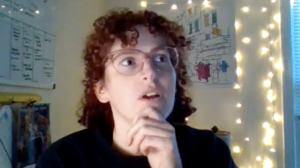‘As Scary As A Virus In Some Ways’: Mental Health Concerns Grow As Remote Schooling Continues

Sarah Banning is a tenth grade English teacher at The Springfield Renaissance School.
(Screen shot/Ben James/NEPM)
Across the country, there are middle and high school teachers begging their students to turn on their Zoom cameras.
You can read their angst-ridden posts on Twitter and Facebook. I can hear their pleas coming from the laptop in my 14-year-old son’s bedroom (he rarely turns on his camera, by the way).
The frustration and desperation in teachers’ voices reflect a fundamental fact: it’s hard to connect with teenagers in remote school.
“I’ve had some students who will not even turn on their cameras,” said Daniel Thiombiano, a ninth grade earth sciences teacher at Holyoke High School, where most students are still attending classes remotely. “You can imagine teaching someone you perhaps have never seen. You do not even know if there’s someone on the other end.”
Thiombiano said five of his students have had family members die of COVID-19 in the last month. Some parents are dealing with food insecurity and unemployment. The strain on students is palpable.
“One key symptom of such stress, and an onset of depression really, is a total lack of self-motivation,” Thiombiano said.
Public health officials have been warning for months about the potential risks to kids’ social and emotional well-being during remote schooling. Now, doctors in the Springfield, Massachusetts — and across the country — are increasingly concerned, as youth mental health cases rise in clinics and emergency rooms.
Read the rest of this story at NEPM’s website.
